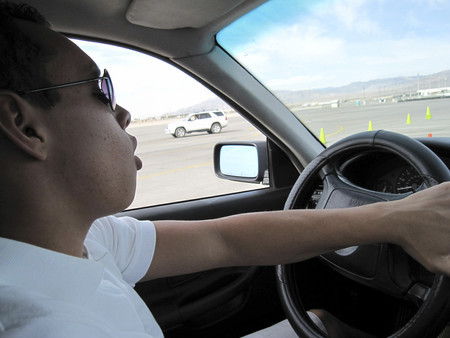Help for teen drivers can go beyond advice

Ian Salvatierra admits he writes text messages while driving. He also fesses up to speeding when he is late for practice.
But most importantly, the 17-year-old Faith Lutheran student acknowledges that neither is a good idea and vows to concentrate more on driving while driving.
“It’s kind of bad,” Salvatierra said after plowing over a few cones while writing text messages during a recent teen driving challenge held by Allstate Insurance.
When kids hit their teen years, parents engage in sometimes awkward discussions about drug use, alcohol abuse and unprotected sex. But there’s a fourth topic, one that is equally important and perhaps easiest to broach: safe driving.
Salvatierra appeared to get it. Now the question is whether other teenagers will too.
There is no question it is a serious subject. Insurance studies indicate it’s the first six months of unsupervised driving that are the most dangerous.
Insurance companies and other groups grapple with new methods to persuade these kids to drive safely. They’ve developed some innovative solutions.
Take Bill, a parent who, like many, greeted the day his son received his license with mixed emotions. So this is what he did.
Bill’s friends and neighbors created a pool and placed a bet on which week in the first year of driving his son would be involved in an accident. If it happened in the chosen week, that person collected the pot. If his son avoided a collision the entire year, he would land the booty. As Bill tells it, his son won. What teenager wouldn’t be ecstatic to collect a few hundred bucks? That’s gasoline money.
Here’s one driving instructor’s challenge: He told his class that 80 percent of all teens get into an accident during the first year of driving. With that, he pulled out a deck of cards and handed four out of every five students a red card, suggesting those who pulled a red card would be involved in an accident within a year.
Melissa Stoloff was 16 years old at the time and was angry when she chose a red card and her, let’s say, less responsible friend pulled black. She tried her best to prove her instructor wrong. Unfortunately, she was in a minor accident less than a month before the year’s end.
“It was a motivation for me to be careful and try hard not to get in an accident,” said Stoloff, now a spokeswoman for Allstate. “I wanted to show everyone I was a good driver and also prove my instructor wrong.”
Then there is Andrew Couch, a business entrepreneur who recently helped launch the Web site platester.com. One aspect is a service it offers to parents of teenage drivers. The site offers “How’s my driving?” bumper stickers similar to those affixed to commercial vehicles. Trucking companies that use the stickers have seen a 20 percent decrease in accidents, according to statistics provided by insurance and trucking businesses.
Couch believes the same philosophy of accountability would work for teen drivers. Parents can buy the sticker for $5. If motorists see the driver acting aggressive or speeding, they can called the number. The folks at platester.com will send a text message to the parent and instantly inform them of the reported infraction.
“That sticker holds the teen more accountable,” Couch said. “Teens aren’t going to be very big on this. It’s more for parents.”
The idea pitched by platester.com received an endorsement from Las Vegas police Sgt. Richard Strader.
“It’s a great idea,” Strader said. “We call those deterrents, like the fear of being pulled over and getting a ticket.”
The business believes it’s brilliant, and cops support the idea. Teens? Let’s go back to our 17-year-old.
“I think it’s a pretty good idea,” Salvatierra said. “A lot of people speed. I’ll admit I do. It’s good to let parents know so they can talk to their kids or take their license away for a while.”
As effective as these different ideas might be, Stoloff suggested that parent-teen conversations about driving should be more positive.
“Make it a positive experience,” Stoloff said. “They can feel empowered if a crash doesn’t happen because they’re smart behind the wheel.”
The bottom line is have a conversation. No doubt drugs and alcohol pose dangers, but car accidents are the No. 1 killers of teenagers.
If you have a question, tip or tirade, call the Road Warrior at 387-2904, or e-mail her at roadwarrior@reviewjournal.com or apacker@reviewjournal.com. Please include your phone number.